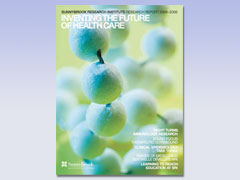The Skeptics
Question everything; trust nothing.
It is the maxim across which Sunnybrook Research Institute neuroscientists Nathan Herrmann and Krista Lanctôt have slung their lab coats in the years since embarking on research to uncover the reality behind a declared association between a certain class of drugs and an unfavourable reaction the drugs are said to produce sometimes.
The subject spiked concerns—first in the medical community; then in the general population—in 2002, when randomized controlled trials of an atypical antipsychotic's use with Alzheimer's patients suggested a higher risk of strokes and other cerebrovascular events, and subsequent increased rates of mortality. In response, Health Canada, along with other regulatory agencies including the FDA in the United States, issued a warning.
The tailspin into which the clinical community was then thrown was what Herrmann and Lanctôt undertook to stabilize. "When the warnings came out," says Herrmann, "we feared they might create a false impression of safety with [regards] to the older class of antipsychotics."
Atypical antipsychotics are the newer iteration of this class of drugs. They were introduced in the early 1990s as a more efficacious and less side-effect-prone replacement to the "typical" treatment for psychosis and related symptoms that's been prescribed since the 1950s.
"Clinicians were left not knowing what to do," says Lanctôt.
The researchers took aim at what they considered to be significant shortcomings within the original research, which sprang from four randomized controlled trials (comprising 1,230 elderly dementia patients) that revealed an increased rate of strokes and transient ischemic attacks among patients taking risperidone compared with those taking a placebo. Herrmann and Lanctôt were dismayed by the modest number of subjects enrolled in the study and the small absolute numbers of subjects who experienced cerebrovascular adverse events. Indeed, they submitted, it was unclear whether there even was a true association. Finally, they pointed out that this research said nothing about whether this apparent reaction was limited to risperidone or if it might extend to other atypical antipsychotics.
The pair launched a study that compared stroke rates among patients taking atypical antipsychotics against those taking their predecessors. The analysis used a retrospective population-based cohort of some 1.4 million patients in Ontario aged over 65 years. One group was taking typical antipsychotics; the other, atypical antipsychotics: either risperidone or olanzapine.
In 2004, Herrmann, who's an associate scientist at SRI and a psychiatry professor at the University of Toronto, and Lanctôt, a scientist at SRI who's also an associate professor of psychiatry and pharmacology at U of T, had their results published in the American Journal of Psychiatry. They reported there was no statistically significant increase in the risk of stroke between the typical and atypical classes of drugs. The article did two things: reassured clinicians that the absolute rates of strokes in patients treated with both types of antipsychotics are low; and warned clinicians, that if they thought they were protecting their patients from adverse cerebrovascular events by using the older typical antipsychotics, they were wrong.
This article is the first in a trio that examine the link between atypical antipsychotics and the risk of cerebrovascular accidents, all of which scrutinize some aspect of the safety of these drugs. The second study is a meta-analysis of the trials that prompted Health Canada's warnings; the third looks at more adverse events associated with the drugs (including mortality, movement disorders, weight gain and diabetes) and attempts to put all that preceded it into perspective.
This research, say the scientists, has only served to strengthen their conviction that skepticism in all things scientific is a good thing. "I was surprised by how little we know about the true safety of these drugs, even after they've been approved and on the market for several years," says Herrmann.
The world, says Lanctôt, has known to be dubious about drug research—whether it validates or undermines it—since the thalidomide disaster. "We shouldn't be surprised," says Lanctôt. "But we always are."
PDF / View full media release »


